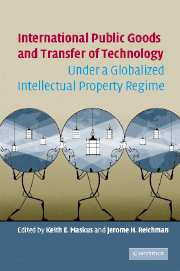Book contents
- Frontmatter
- Contents
- List of contributors
- Preface
- PART I International Provision of Public Goods under a Globalized Intellectual Property Regime
- 1 The Globalization of Private Knowledge Goods and the Privatization of Global Public Goods
- 2 The Regulation of Public Goods
- Comment: Norms, Institutions, and Cooperation
- 3 Distributive Values and Institutional Design in the Provision of Global Public Goods
- 4 Koyaanisqatsi in Cyberspace: The Economics of an “Out-of-Balance” Regime of Private Property Rights in Data and Information
- 5 Linkages Between the Market Economy and the Scientific Commons
- Comment I: Public Goods and Public Science
- 6 Sustainable Access to Copyrighted Digital Information Works in Developing Countries
- 7 Agricultural Research and Intellectual Property Rights
- Comment II: Using Intellectual Property Rights to Preserve the Global Genetic Commons: The International Treaty on Plant Genetic Resources for Food and Agriculture
- PART II Innovation and Technology Transfer in a Protectionist Environment
- PART III Sectoral Issues: Essential Medicines and Traditional Knowledge
- PART IV Reform and Regulation Issues
- Index
Comment: Norms, Institutions, and Cooperation
Published online by Cambridge University Press: 05 May 2010
- Frontmatter
- Contents
- List of contributors
- Preface
- PART I International Provision of Public Goods under a Globalized Intellectual Property Regime
- 1 The Globalization of Private Knowledge Goods and the Privatization of Global Public Goods
- 2 The Regulation of Public Goods
- Comment: Norms, Institutions, and Cooperation
- 3 Distributive Values and Institutional Design in the Provision of Global Public Goods
- 4 Koyaanisqatsi in Cyberspace: The Economics of an “Out-of-Balance” Regime of Private Property Rights in Data and Information
- 5 Linkages Between the Market Economy and the Scientific Commons
- Comment I: Public Goods and Public Science
- 6 Sustainable Access to Copyrighted Digital Information Works in Developing Countries
- 7 Agricultural Research and Intellectual Property Rights
- Comment II: Using Intellectual Property Rights to Preserve the Global Genetic Commons: The International Treaty on Plant Genetic Resources for Food and Agriculture
- PART II Innovation and Technology Transfer in a Protectionist Environment
- PART III Sectoral Issues: Essential Medicines and Traditional Knowledge
- PART IV Reform and Regulation Issues
- Index
Summary
I am neither an economist nor an expert on intellectual property rights. Instead, I am a student of world politics. The responsibility for my being a commentator rests entirely with the editors of this volume!
What little I have to say relates mostly to Peter Drahos' very interesting chapter, since he refers to the “…imperfections of global institutions to regulate activity involving production of public goods.” Paul David's chapter alludes to certain problems that arise internationally – in competition between the United States and the European Union, and with respect to developing countries. To that extent, my comments are relevant to his fascinating contribution as well.
Distinctive problems of the world political economy
In the background of both chapters is a set of problems having to do with politics at the global level, which are characterized by a lack of effective comprehensive government and a fragmentation of law. Five problems can be singled out as particularly important.
Incentives are not well-designed for efficiency. The issue of incentives is at the heart of this volume. Internationally, there are often incentives for actors to externalize the costs of their actions on those outside of their countries or economic unions. Actors also have incentives to free-ride on the accomplishments of others, unrestrained by government action.
Institutions at the global level are weak. Their rulings are often not authoritative in a meaningful, operational sense.
[…]
- Type
- Chapter
- Information
- International Public Goods and Transfer of Technology Under a Globalized Intellectual Property Regime , pp. 65 - 68Publisher: Cambridge University PressPrint publication year: 2005
- 3
- Cited by



